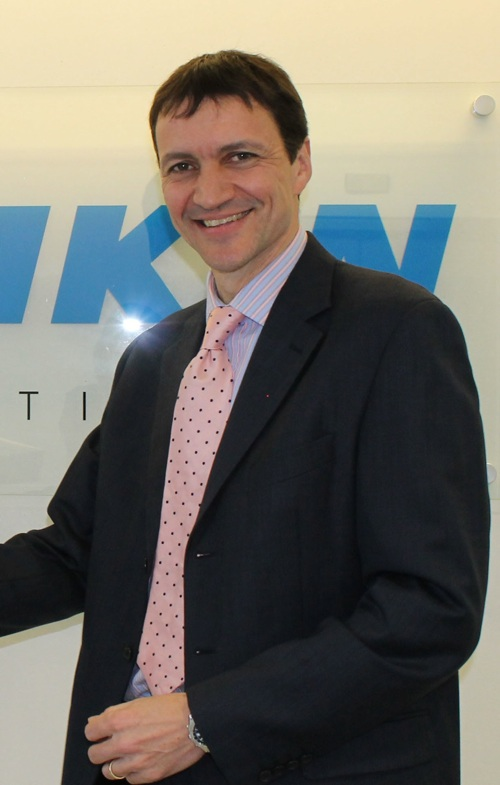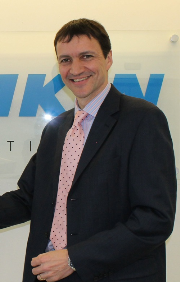
December has brought the R22 phase-out period to a close and the use of recycled or virgin HCFCs to service HVAC equipment is now illegal. “Businesses that have struggled to make their HVAC equipment fit for purpose by now are facing increased business risk as a result of non-compliance with national and European ozone and F-gas regulations”, warns Daikin UK’s Product Manager, Martin Passingham (pictured). He urges affected businesses to opt for a new system installation as the most reliable long-term route. Having allowed users of HVAC systems four years to switch over to non-HCFC substances, the prohibition of so-called transitional HCFC refrigerants like R22 should not come as a surprise to anyone. Yet many smaller retail businesses, offices and hotels with existing plant may have found it difficult to adapt their systems to comply with the legislation that has finally taken effect in January 2015. “The capital outlay for an overhaul may have struck some owners as prohibitive,” says Martin Passingham. “Others may not have been made sufficiently aware of the looming R22 ban by their installers. Either way, these organisations immediately need to expedite their planned system updates or initiate an appropriate course of action if they do not wish to risk not having an operational air conditioning system.” “A system replacement clearly presents the most reliable solution to comply,” he emphasizes. “Whilst with some systems it is possible to move to the use of drop-in HFC refrigerant that is compatible with the system’s existing oil, such ‘retrofits’ are not a reliable option to bring plant up to scratch as they are likely to compromise system performance. Installers should therefore recommend replacement technology to hotels and retailers, for example, since their business success largely depends on the flawless operation of HVAC equipment and a balanced indoor climate. “Daikin UK’s VRV-Q system offers a tried and tested, flexible replacement option. It can reuse existing refrigerant pipes as well as the in situ wiring network to keep cost down while its phased in, fast installation means that the customer’s daily business is not interrupted during the upgrade. Higher quality indoor and outdoor units also ensure superior performance through improved design and energy saving features. As an added bonus, better control of the indoor climate by users delivers significantly enhanced comfort levels and has proved to achieve reduced energy consumption.
December has brought the R22 phase-out period to a close and the use of recycled or virgin HCFCs to service HVAC equipment is now illegal. “Businesses that have struggled to make their HVAC equipment fit for purpose by now are facing increased business risk as a result of non-compliance with national and European ozone and F-gas regulations”, warns Daikin UK’s Product Manager, Martin Passingham (pictured). He urges affected businesses to opt for a new system installation as the most reliable long-term route.
Having allowed users of HVAC systems four years to switch over to non-HCFC substances, the prohibition of so-called transitional HCFC refrigerants like R22 should not come as a surprise to anyone. Yet many smaller retail businesses, offices and hotels with existing plant may have found it difficult to adapt their systems to comply with the legislation that has finally taken effect in January 2015.
“The capital outlay for an overhaul may have struck some owners as prohibitive,” says Martin Passingham. “Others may not have been made sufficiently aware of the looming R22 ban by their installers. Either way, these organisations immediately need to expedite their planned system updates or initiate an appropriate course of action if they do not wish to risk not having an operational air conditioning system.”
“A system replacement clearly presents the most reliable solution to comply,” he emphasizes. “Whilst with some systems it is possible to move to the use of drop-in HFC refrigerant that is compatible with the system’s existing oil, such ‘retrofits’ are not a reliable option to bring plant up to scratch as they are likely to compromise system performance. Installers should therefore recommend replacement technology to hotels and retailers, for example, since their business success largely depends on the flawless operation of HVAC equipment and a balanced indoor climate.
“Daikin UK’s VRV-Q system offers a tried and tested, flexible replacement option. It can reuse existing refrigerant pipes as well as the in situ wiring network to keep cost down while its phased in, fast installation means that the customer’s daily business is not interrupted during the upgrade. Higher quality indoor and outdoor units also ensure superior performance through improved design and energy saving features. As an added bonus, better control of the indoor climate by users delivers significantly enhanced comfort levels and has proved to achieve reduced energy consumption.